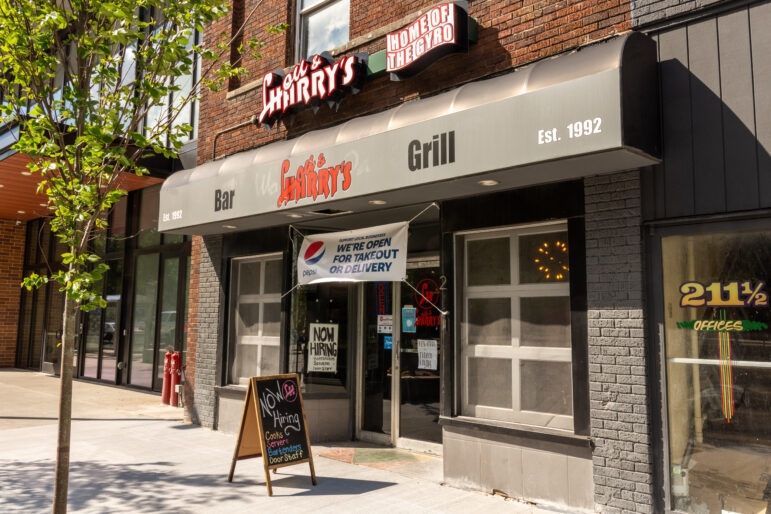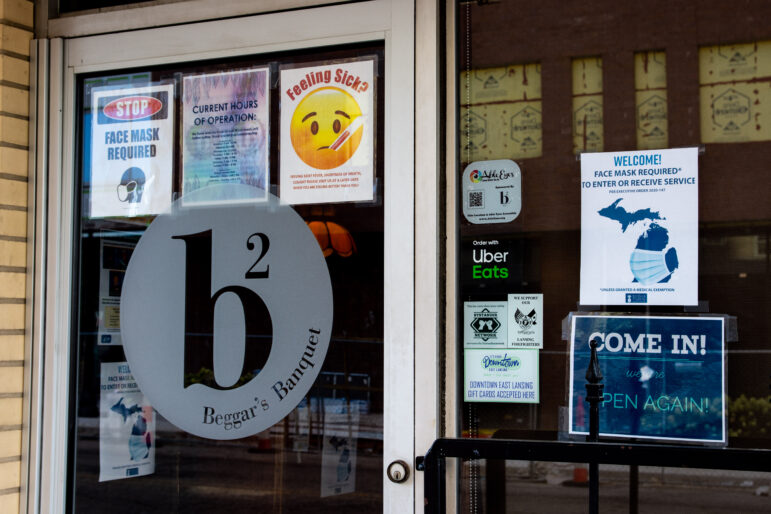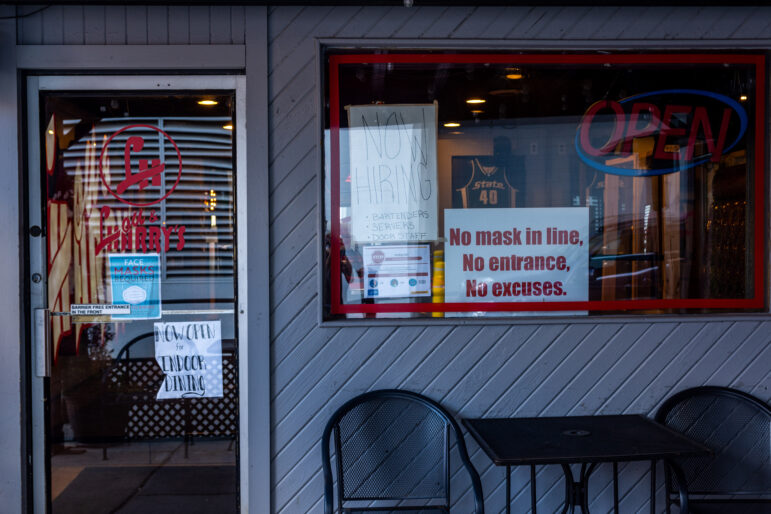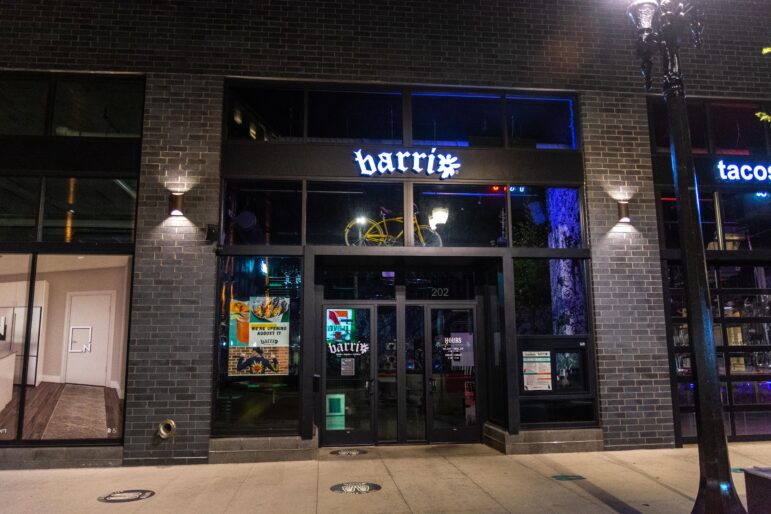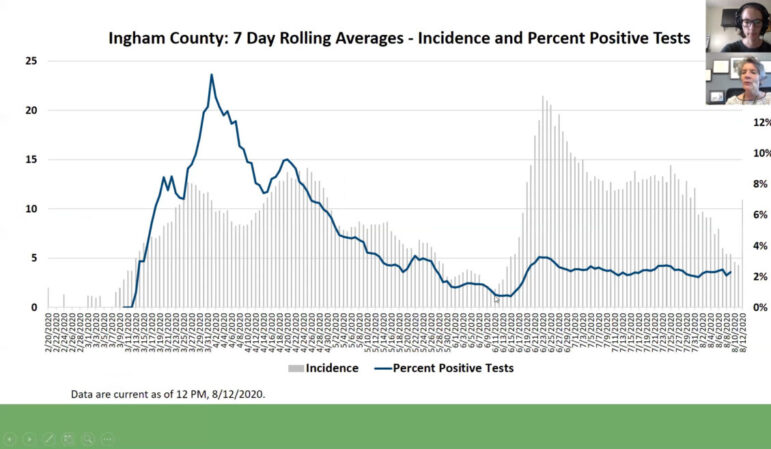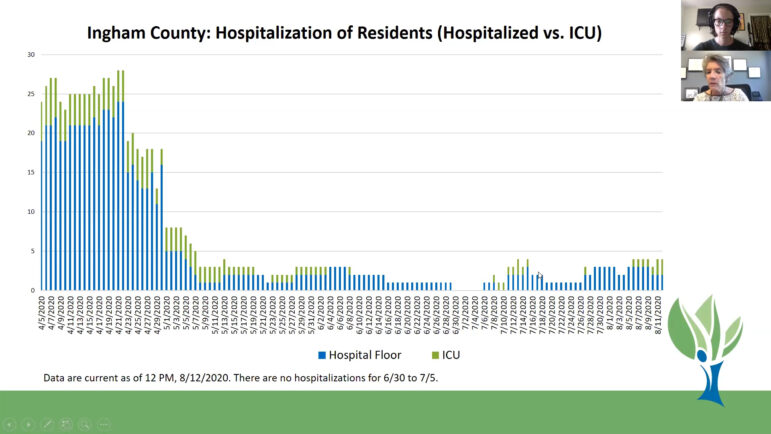The typically loud and rambunctious crowds in East Lansing bars have been replaced with control and regulation, rendering a dramatic change in the bar scene since the start of the COVID-19 pandemic.
“Before [the pandemic], it was very laid back, it was a fun environment to make good money at,” said Lauren Dix, server at Beggar’s Banquet. “It’s just a little bit tenser and there are not as many people coming in.”
After the COVID-19 pandemic forced Michigan State University to end in-person classes, hundreds of students flocked to the local bars in East Lansing. Not long after, the lack of social distancing and mask-wearing at many bars and restaurants caused many of them to shut down or implement new rules in order to minimize the spread of the coronavirus.
Four months after the pandemic reached East Lansing, many bars and restaurants attempted to re-open after Gov. Gretchen Whitmer issued an executive order on June 1 that allowed them to begin conducting business again. Some were able to open successfully, relying on curbside pickup and takeout orders to make up for the revenue that they lost while being forced to close down but, others, however, were not as successful. Some businesses shut down willingly, deciding that they wanted to put the safety of their customers and staff first; Harper’s Restaurant and Brewpub was linked to an outbreak of 185 cases as of July 11, causing them to have to shut down shortly after reopening.
Dix said that there were many new protocols that Beggar’s Banquet implemented in order to keep customers and staff safe. Staff members got their temperatures taken upon entrance and they had to fill out a questionnaire about their health. Staff also had to wear masks at all times, no matter where they were in the restaurant. The restaurant even provided masks for people if they did not bring one. New sanitation methods were employed to ensure a deeper clean. The biggest change came from their new QR code menus, where customers could scan a code and pull up a menu using their phones to reduce the waste of single-use menus and so customers could feel safe when deciding what they wanted to order.
New to the East Lansing bar scene, Barrio opened its doors on March 9, only to be closed down shortly after on March 16. It was able to re-open June 9 with plenty of safety measures, including six-foot-apart markers on the front walkway, no patron allowed in the building for any reason unless they were heading to their seat, hand sanitizer for staff and customers, and the removal of their communal items such as napkin dispensers, menus, and the build-your-own taco station. Barrio also got rid of potentially contaminable items such as garnishes like lemon and lime and cocktail straws, which were replaced with wrapped straws available upon request. It’s staff was required to wear masks, said owner Jake Hawley.
But then Barrio closed their doors again on June 29.
“Things changed dramatically [for us] when things changed within our community, there was that spike in COVID-19 cases,” said Hawley. “At that point, it kind of scared everybody away. The first week, week and a half that we reopened in June were very busy. People felt comfortable coming out and things were kind of back to normal.”
Linda Vail is the Ingham County Health officer. She said that when bars and restaurants opened for the first time after initially getting closed because of the coronavirus pandemic, there was a glitchy start.
“I probably would’ve put an upper limit cap on bars and restaurants as we’ve done here, not necessarily permanently,” said Vail. “I think part of it is that here we have bars and restaurants and as a health department we inspect them for all kinds of things. And then you throw in these executive orders and a whole bunch more rules and there’s lots of executive orders. Some of them are long and complicated and everybody doesn’t know where they are or how to find them or where to find the part that is relevant to them and so I think that probably it would have behooved us to give bars and restaurants some experience with smaller numbers of people before we opened up to larger numbers of people.”
Despite the effort to ensure customer safety, all of these safety efforts and protocols were rendered useless for the time being after Whitmer signed Executive Order 2020–160 and Executive Order 2020-16, which amended Michigan’s Safe Start Order and implemented new workplace safety guidelines which limited indoor gatherings to 10 people statewide and mandated bars to shut down their indoor service as of July 31.
Julia Marshall, a bartender at Harper’s Restaurant and Brewpub, said that Harper’s changed their day-to-day operations to comply with newly implemented guidelines. The establishment closed down before St. Patrick’s Day and re-opened on June 8. Employees were required to wear masks and had their temperatures taken in addition to being asked health questions upon entry. Tables were six feet apart and people coming to the bar were encouraged to social distance and wear masks, said Marshall.
“I was worried when I heard about the cases,” said Marshall. “People who I worked with went and got tested and ended up testing positive. I started feeling fatigued so I went and got tested myself and tested positive for COVID. I had to quarantine alone in East Lansing for a while, which prevented me from being able to go home for Father’s Day. I didn’t want to spread the virus to my parents. It was hard.”
This surge of COVID-19 cases linked to Harper’s raised a lot of questions to the owners of Harper’s, Patrick and Patricia Riley. The Michigan Liquor License Commission (MLCC) issued an order to show cause hearing on July 16 in order for the Rileys to show cause as to the status of its Class C and Brewpub licenses, permits, and permissions under the Liquor
Control Code and the Commission’s administrative rules. At the hearing, the Riley’s also had to answer questions about the steps they took, or failed to take, in compliance with Whitmer’s executive orders as well as describe their plan for ensuring the safety of patrons upon the re-opening of Harper’s.
“Honestly, right now, especially in East Lansing obviously everyone’s attention has been grabbed and nobody wants something like this to happen again, including the Riley’s who own Harpers, said Vail. “They don’t want to see this happen again they didn’t want to see it happen in the first place. They didn’t know what they didn’t know to some extent and they needed to not operate business as usual Harpers and they know that now.”
With all of this controversy around Harper’s, Marshall said she is unsure whether she will return to work at Harper’s. She said that her return would depend on whether or not the Rileys will install more safety measures than the first time, such as putting plexiglass around the bar area just high enough to put a cup under, using plastic cups and placing garbage cans around the bar so staff members do not have to pick them up, and installing a new HVAC system.
Jay de los Reyes, chief operating officer at McLaren Greater Lansing Hospital, said that it was necessary to close restaurants and businesses at the beginning of the pandemic. While the world was still at the front end of learning about the virus and how it spread, he said, closing these businesses was the right response, but opening them back up now is acceptable with proper guidelines and following the rules of Whitmer’s executive orders.
De los Reyes thinks opening the bars back up is a bit more tricky than opening restaurants back up because of the nature of their setting, being an establishment in which people usually come to get inebriated and have a good time. He said that if the bars are properly set up and spaced out to meet social distancing guidelines, then they could open safely, though he knows that is unlikely to happen and people will lose the capacity to properly distance themselves.
De los Reyes said he is concerned with the hundred-plus COVID-19 cases that surfaced from Harper’s Restaurant and Brew Pub in East Lansing. He said that he heard about it and that it could have easily been prevented had people been following the guidelines.
“With respect specifically to Harper’s, if the capacity in the bar would have been following the proper guidelines, and if everyone had been social distancing and maintained it throughout the entire night, then there would have been a smaller probability the outbreak would’ve occurred at the rate that it did,” said de los Reyes.
Richard Baillie, economics professor at Michigan State University, has been studying economics for 40 years. He said that in his time he has never witnessed a pandemic and seen the effects it has on the economy.
“Looking at the recent figures on what has happened in the first two quarters of the year, the GDP output is likely to drop as much as 30% and that is a very significant drop,” Baillie said. “The only thing that is similar to this is the Great Depression.”
When looking at the economy in the Lansing area, Baillie said that the bars and restaurants makeup between 5% to 10% of the economy. A lot of these jobs are low income and part-time jobs.
“What concerns me about the bars being closed is that it really reduces the number of part-time jobs for young undergraduate students,” Baillie said. “I know this will be a hard hit for them come fall if they aren’t open again.”
“Lets keep in mind that COVID is not going away, it’s here,” said Vail. “It’s not going away anytime soon, the measures that were taken were really not about ‘Wow we all need you all to be terrified of this virus and not go anywhere or do anything’ it was really about ‘Its a novel virus, nobody has immunity to it. Because of that, when it hits, everybody is going to get sick at the same time. We can’t handle everybody getting sick at the same time.”
On Sept. 2, students will be returning to classes for the fall semester at Michigan State University. Vail said that as long as bar and restaurant patrons follow guidelines, local establishments will be able to remain open.
“One, wear a mask,” said Vail. “Two, socially distance. Three, avoid large gatherings, particularly indoor large gatherings. Don’t do it. Four, wash your hands and of course don’t touch your face. Five, stay home when you’re sick … if everybody would do those things for three weeks, we got this but we can’t get everybody to agree to do it and that is our problem.”
“Wearing masks, social distancing, washing your hands are all things that work to prevent the spread of the virus, everyone should be doing those things,” de los Reyes said. “Everyone should be doing that during the regular flu season as well, so if we’ve learned anything it’s that all of those things are effective.”
